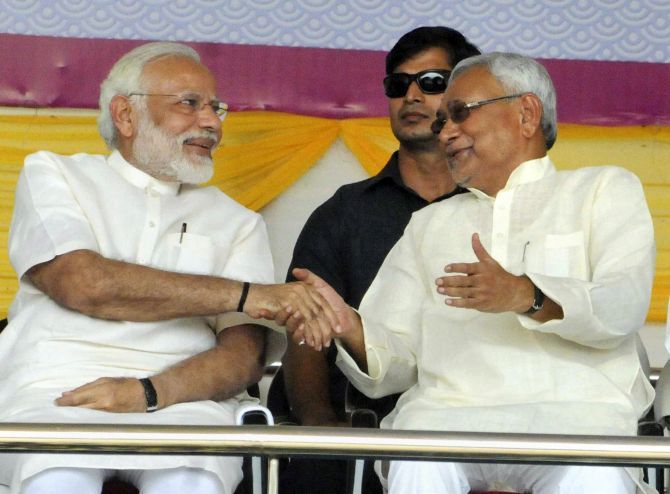The JD-U appears unwilling to become the BJP's second-string. A senior leader said, "If the BJP demands that the 2014 polls be made the yardstick for seat-sharing in 2019, we will insist the results of the last assembly polls become the criterion for the next state election."
Radhika Ramaseshan reports.

The cracks in the National Democratic Alliance's scaffolding first surfaced in Bihar when Jitan Ram Manjhi, who headed the Hindustani Awam Morcha-Secular, left the coalition.
Manjhi was the HAM-S's lone member in the assembly, so he hardly rocked the partnership between the Bharatiya Janata Party and the Janata Dal-United.
The Indian National Lok Dal in Haryana walked out shortly thereafter to team up with the Bahujan Samaj Party in the impending elections.
The NDA suffered a big jolt when the Telugu Desam Party quit. The sequence of departures saw another constituent, the Peoples Democratic Party, leave the ruling coalition, although this time the BJP cast the first stone.
The Shiv Sena is perennially in slow burn while another Bihar entity, the Rashtriya Lok Samta Party, teeters precariously.
Logically, the disquiet gives Nitish Kumar, Bihar chief minister and JD-U chief, primacy in the NDA. Although he has resisted the temptation to exert his importance, he is making the noises that might alarm the Delhi establishment.
Sushil Kumar Modi, BJP leader and deputy chief minister, rejected such a possibility saying, "We are looking at our alliance as a long-term relationship that's not meant for a couple of elections. We had worked for 17 years in the past. Issues like seat-sharing are never sticking points."
Sushil Kumar Modi, a Jayaprakash Narayan adherent like Kumar, is looked askance at by sections of the Bihar BJP for his perceived closeness to the chief minister and his alleged inability to grow out of his shadow.
The outcome of the last assembly election that all but wiped out the BJP has taken away the sheen the party was coated in after the 2014 Lok Sabha polls.
A veteran Bihar observer characterised the alliance as one of "mutual dependence in which no party should play big brother". He explained, "(Prime Minister) Narendra D Modi cannot repeat a 2014 in 2019, even if the anti-incumbency sentiment against him is not huge. Kumar is no longer interested in Delhi. He has to guard his Bihar turf after Lalu Prasad (of Rashtriya Janata Dal) got a new lease on life."
A former associate of Kumar agreed. "Even if the BJP ministers in the CM's cabinet tolerate Kumar's airs and attitude, the wily duo of (PM) Modi and (Amit A) Shah will not mollycoddle him. Kumar has lost all the recent by-elections. Several times Modi indicated that Kumar will not regain his past pre-eminence."
The JD-U, on the other hand, appeared unwilling to become the BJP's second-string. A senior leader said, "If the BJP demands that the 2014 polls be made the yardstick for seat-sharing in 2019, we will insist the results of the last assembly polls become the criterion for the next state election."
To revisit the statistics, the BJP had contested the previous Lok Sabha election with Ram Vilas Paswan's Lok Janshakti Party and the RSLP, helmed by Union Minister Upendra Kushwaha.
Bihar too was swamped by a Modi wave, as a result of which the BJP won 22 of the 40 seats, the LJP six and the RSLP three. Nitish was left with two seats.
A year later, in the assembly polls, a serious upset left the BJP with 53 of the 157 seats it contested with its old allies and the HAM-S. The JD-U won 71 of the 101 seats it had contested, while its the then allies the RJD picked up 80 (out of 101), and the Congress 27 (out of 41).
Sources in the JD-U cited the findings of a 'mood of the nation' survey carried out between April 28 and May 17, 2018, by Lokniti and the Centre for the Study of Developing Societies to shore up the point that among the states checked out, Bihar was more positively inclined towards the Modi government, with 69 per cent endorsing it and only 29 per cent saying they were dissatisfied.
"We are strong and we don't want to leave the coalition," stressed a colleague of Kumar.
Indeed, JD-U leaders underlined that Kumar was an 'exemplary' ally. Rajya Sabha MP Harivansh Narayan Singh said, "When we were part of the UPA (United Progressive Alliance), we never uttered a word against the surgical strikes or policies that the Opposition criticised."
If lately, Kumar flagged the demand for special category status to Bihar forcefully, spokesperson Pavan Varma said, "We have a point of view on national and state issues that the CM has voiced with dignity and consistency."
A BJP functionary -- conceding that his party was in line with Kumar's prohibition policy, corruption checks and cracking down on hoods -- belittled the CM, claiming the only attribute he brought to the table was "that bit of shine still left on his demeanour that appealed to all castes".
The cracks need to be closed before 2019.











